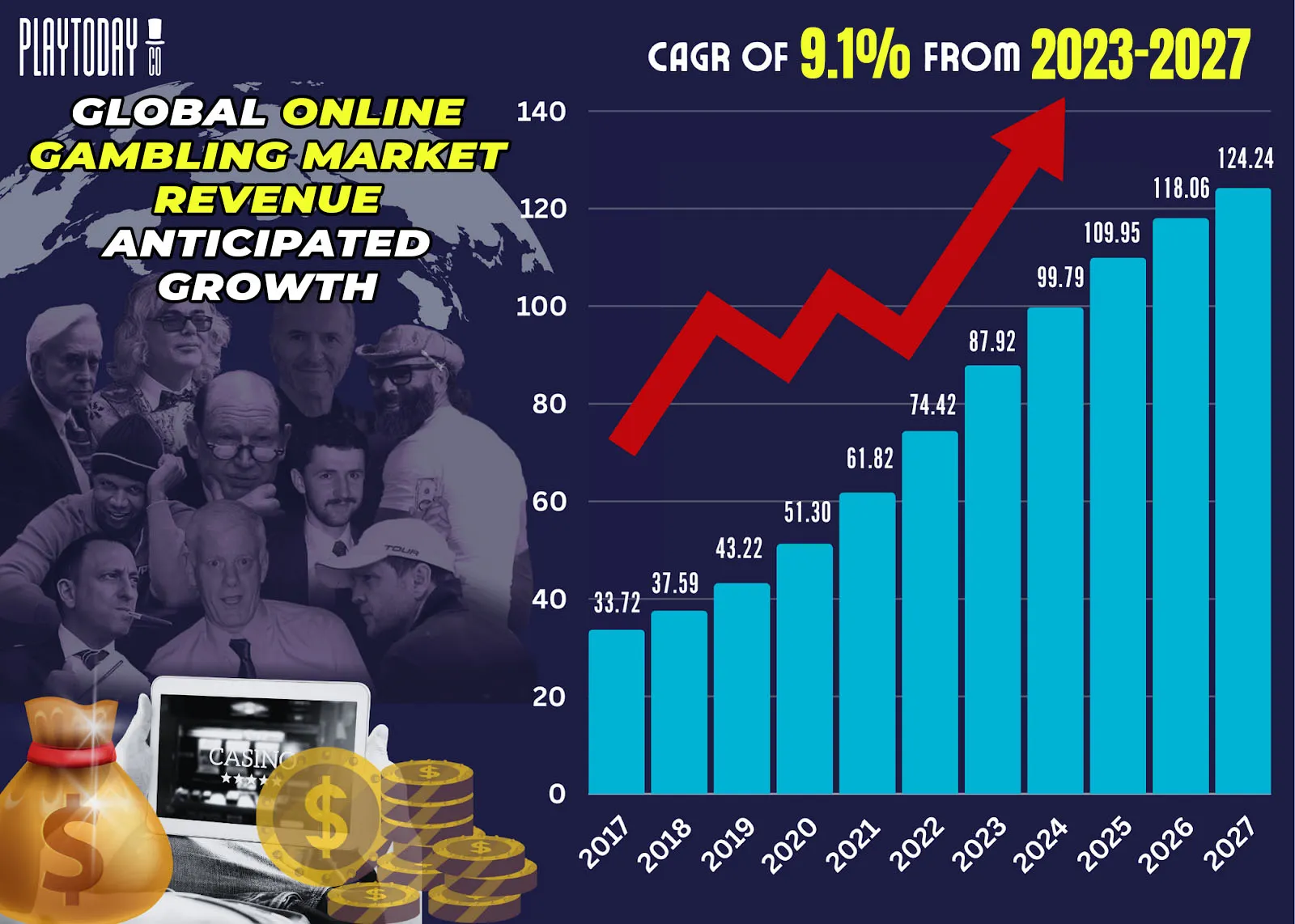Online gambling has been gaining popularity in recent years as more and more people turn to the internet for their entertainment needs. In fact, according to the latest online gambling stats from PlayToday, the industry is expected to reach a market value of $102.97 billion globally by 2025. With the convenience of being able to gamble from the comfort of your own home, coupled with the increasing use of mobile devices, it’s no wonder why online gambling is on the rise.
But what exactly does the world of virtual betting look like? In this article, we’ll dive into the online gambling stats and trends, exploring the various aspects of this growing industry.

The Evolution of Online Gambling
Before we delve into the statistics, it’s important to understand the history and evolution of online gambling. The first online casino was launched in 1994, and since then, the industry has seen significant growth and advancements. From traditional casino games like blackjack and roulette, to sports betting and even virtual reality casinos, the online gambling world has come a long way.
With the introduction of mobile gambling, players can now access their favorite games anytime and anywhere, making it even more convenient and accessible. The rise of cryptocurrency has also made its way into the online gambling scene, with many casinos now accepting bitcoin and other digital currencies as forms of payment.
The Rise of Mobile Gambling
One of the biggest driving forces behind the growth of online gambling is the increase in mobile gambling. According to a report by H2 Gambling Capital, the share of global gambling revenue generated through mobile devices is expected to reach 44% by 2023. This is due to the rise in smartphone usage and the development of user-friendly mobile apps by online gambling operators.
The convenience and accessibility of mobile gambling has attracted a younger audience, with millennials being one of the largest demographics engaging in virtual betting. This trend has forced traditional brick and mortar casinos to adapt and create their own online platforms in order to stay competitive in the market.
The Impact of Cryptocurrency
Another factor contributing to the growth of online gambling is the use of cryptocurrency as a form of payment. With the growing acceptance and popularity of digital currencies, many online casinos are now offering players the option to deposit and withdraw funds using bitcoin, ethereum, and other cryptocurrencies.
Not only does this provide a sense of anonymity for players, but it also allows for faster and more secure transactions. Additionally, the decentralized nature of cryptocurrency appeals to those who are skeptical of traditional banking systems.
Online Gambling Stats and Trends

Now that we have a better understanding of the evolution of online gambling, let’s take a look at some of the latest statistics and trends in the industry.
Market Value and Growth
The global online gambling market was valued at $58.9 billion in 2019, and is expected to reach $102.97 billion by 2025, growing at a CAGR of 11.5% during the forecast period. This growth can be attributed to the increasing use of smartphones and internet connectivity, coupled with the rise of virtual reality and augmented reality technologies.
In terms of regional markets, Europe holds the largest share of the global online gambling market, followed by North America and Asia Pacific. However, the Asia Pacific region is expected to experience the highest growth rate due to the increasing popularity of online gambling in countries like China and India.
Popularity of Different Types of Online Gambling
According to a report by Statista, online sports betting is the most popular type of online gambling, with a market share of 40%. This is followed by online casino games (26%), poker (18%), and bingo (10%). However, the fastest-growing segment in the online gambling market is esports betting, which has seen a significant increase in popularity in recent years.
Major Players in the Industry
The online gambling market is highly competitive, with many established and new players entering the scene. Some of the major players in the industry include Bet365, William Hill, 888 Holdings, and GVC Holdings. These companies offer a wide range of online gambling services, including sports betting, casino games, and poker.
Responsible Gambling and Regulations
With the growing popularity of online gambling, there has been an increased focus on responsible gambling and regulations. Many countries have implemented strict laws and regulations to ensure the safety and protection of players. This includes age restrictions, self-exclusion programs, and measures to prevent money laundering and fraud.
In addition, many online gambling operators have also taken steps to promote responsible gambling by offering tools such as setting deposit limits and providing resources for those who may be at risk of developing a gambling addiction.
Technological Advancements
The online gambling industry has seen significant technological advancements in recent years, leading to a more immersive and realistic gaming experience for players. Virtual reality (VR) and augmented reality (AR) technologies are being incorporated into online casinos, allowing players to interact with the virtual world just as they would in a traditional casino.
Furthermore, the use of artificial intelligence (AI) and data analytics has also improved the overall user experience. AI can be used to personalize the gaming experience for each player, while data analytics can provide valuable insights and help operators make better business decisions.
The Impact of COVID-19 on Online Gambling
The global pandemic caused by COVID-19 has had a major impact on various industries, including online gambling. With people staying at home and looking for ways to pass the time, the demand for online gambling has significantly increased.
According to a survey conducted by the American Gaming Association, 35% of Americans have considered trying online gambling for the first time during the pandemic. This has led to a surge in revenue for online gambling operators, with some reporting a 25% increase in revenue compared to pre-pandemic levels.
However, the pandemic has also brought about challenges for the industry. With major sports leagues being suspended, sports betting saw a decline in revenue. Traditional brick and mortar casinos were also forced to close their doors, leading to an increase in players turning to online platforms for their gambling needs.
The Future of Online Gambling

With the continuous advancements in technology and the increasing popularity of virtual betting, the online gambling industry is set to continue its upward trajectory. However, there are also several challenges that the industry will have to face.
One of the main challenges is dealing with regulatory changes and adapting to different laws in various countries. As online gambling continues to expand globally, it’s important for operators to navigate the ever-changing legal landscape while ensuring compliance with regulations.
Additionally, the industry must also address concerns surrounding responsible gambling and work towards creating a safe and enjoyable environment for players.
Conclusion
In conclusion, the world of online gambling is constantly evolving and expanding, offering a wide range of opportunities for both players and operators. The convenience and accessibility of virtual betting, coupled with technological advancements, have made it a popular form of entertainment for people all over the world.
The statistics and trends show that the industry is expected to continue its growth, but it’s important for operators to also focus on responsible gambling and adhere to regulations in order to ensure a sustainable future for the industry.